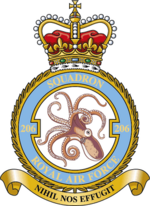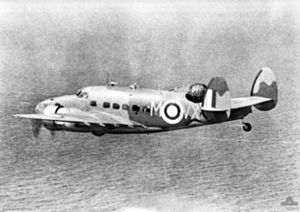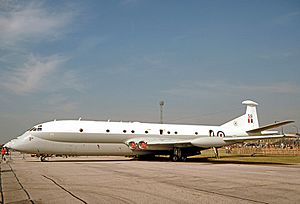No. 206 Squadron RAF facts for kids
Quick facts for kids No. 206 Squadron RAF |
|
|---|---|

Squadron badge
|
|
| Active |
|
| Country | |
| Branch | |
| Type | Flying squadron |
| Role | Test and evaluation |
| Part of | Air Warfare Centre |
| Home station | RAF Brize Norton |
| Motto(s) | Nihil nos effugit (Latin for 'Nothing escapes us') |
| Aircraft |
|
| Battle honours |
|
| Insignia | |
| Squadron badge | An Octopus, with its many legs and quick activity, symbolises the squadron's efforts in many branches of service work. Approved by King George VI in January 1938. |
| Squadron codes | WD (Nov 1938 – Sep 1939) VX (Sep 1939 – Mar 1944) PQ (Apr 1944 – Apr 1946) B (Sep 1952 – May 1958) |
No. 206 Squadron is a special team in the Royal Air Force (RAF). Their main job is to test and evaluate new aircraft and equipment. This means they fly new planes and try out new systems to make sure they work well and are safe for other RAF pilots to use.
Before 2005, the squadron was known for its important role in maritime patrol. They used Nimrod MR.2 aircraft to fly over the sea, looking for submarines and keeping an eye on things. They were based at RAF Kinloss in Scotland. In 2005, the squadron was temporarily closed down as part of a plan to make the RAF smaller. However, it was reformed in 2009 and continues its vital testing work today.
Contents
The Story of 206 Squadron
How it All Began: Early Years
No. 206 Squadron first started on December 31, 1916. Back then, it was called No. 6 Squadron of the Royal Naval Air Service (RNAS). They flew Nieuport 17 and later Sopwith Camel planes. These were fighter planes used during World War I over the Western Front.
The squadron was closed for a short time in August 1917. But it quickly reformed on January 1, 1918. This time, they were a bomber and reconnaissance unit, flying Airco DH9 aircraft. When the RAF was created in 1918, the squadron became No. 206 Squadron, RAF. They took photos from the air to help the British Army and dropped bombs to support attacks. After the war ended, they even helped deliver mail for the army in Germany. In 1919, they moved to Egypt and were later renamed 47 Squadron in 1920.
Between the Wars and World War II
The squadron was started again on June 15, 1936, at RAF Manston. They became part of the new RAF Coastal Command, which protected the seas around Britain. They flew Avro Anson planes and moved to RAF Bircham Newton a month later. At first, they trained pilots, but soon they began flying patrols over the sea.
When World War II began, the squadron flew regular patrols with their Ansons. They were based at Bircham Newton and had smaller teams at other airfields. In September 1939, they attacked German submarines twice, but their bombs were not very effective. The squadron's Ansons also sometimes met German planes. In November 1939, one Anson shot down a Heinkel He 115 floatplane. On the same day, another Anson probably shot down a Dornier Do 18.
In March 1940, the squadron started using the faster Lockheed Hudson aircraft. They flew their first patrols with the new planes in April. Later, in July 1942, they switched to the Boeing Fortress Mk.II. These planes could fly much longer distances over the Atlantic Ocean. In October 1943, they moved to the Azores islands.
After that, they returned to the UK and got new planes: the Consolidated Liberator Mk.VI and later the Mk.VIII. These Liberators were based at RAF St Eval until after D-Day. Then the unit moved north to RAF Leuchars. A small part of the squadron went to West Africa to hunt submarines and protect convoys. The squadron was closed down on April 25, 1946.
No. 206 Squadron was very good at hunting submarines during World War II. They destroyed nine German U-boats.
After the Wars
The squadron was reformed on November 17, 1947, flying Avro York C.1 transport planes. But it was closed again in August 1949. It reformed quickly on December 1, 1949, flying Douglas Dakotas. These were military versions of the famous Douglas DC-3 airliner. This time, it only lasted until February 20, 1950.
The squadron was reformed once more on September 27, 1952. It became a maritime reconnaissance squadron again, flying Avro Shackleton planes from RAF St Eval. In July 1965, the squadron moved to RAF Kinloss in Scotland. In November 1970, they got new jet-powered planes called the Hawker-Siddeley Nimrod. They continued to fly the Nimrod until the squadron was closed on April 1, 2005.
Today's Squadron
On April 1, 2009, the Heavy Aircraft Test & Evaluation Squadron was given the No. 206 Squadron name. It became 206 (Reserve) Squadron. Today, the squadron is split between RAF Boscombe Down and RAF Brize Norton. The team at Brize Norton works with Hercules planes, continuing to test and evaluate them. They also work with the Airbus Atlas aircraft.
Aircraft Used by 206 Squadron
This table shows the different types of aircraft that No. 206 Squadron has flown throughout its history:
| From | To | Aircraft | Version |
|---|---|---|---|
| Dec 1916 | Jun 1917 | Nieuport 17 | |
| Jun 1917 | Aug 1917 | Sopwith Camel | |
| Jan 1918 | Mar 1918 | Airco D.H.4 | |
| Feb 1918 | Jan 1920 | Airco D.H.9 | |
| Jun 1936 | Jun 1940 | Avro Anson | Mk.I |
| Mar 1940 | Aug 1942 | Lockheed Hudson | Mk.I |
| Apr 1941 | Jun 1941 | Lockheed Hudson | Mk.II |
| Apr 1941 | Aug 1942 | Lockheed Hudson | Mk.III |
| Apr 1941 | Aug 1941 | Lockheed Hudson | Mk.IV |
| Jun 1941 | Aug 1942 | Lockheed Hudson | Mk.V |
| Jul 1942 | Apr 1944 | Boeing Fortress | Mks.II, IIA |
| Apr 1944 | Apr 1946 | Consolidated Liberator | Mk.VI |
| Mar 1945 | Apr 1946 | Consolidated Liberator | Mk.VIII |
| Nov 1947 | Feb 1950 | Avro York | C.1 |
| Jan 1950 | Feb 1950 | Douglas Dakota | C.4 |
| Sep 1952 | May 1958 | Avro Shackleton | MR.1A |
| Feb 1953 | Jun 1954 | Avro Shackleton | MR.2 |
| Jan 1958 | Oct 1970 | Avro Shackleton | MR.3 |
| Nov 1970 | Sep 1979 | Hawker-Siddeley Nimrod | MR.1 |
| Oct 1979 | Apr 2005 | Hawker-Siddeley Nimrod | MR.2 |
| Apr 2009 | Present | Lockheed Hercules | Mk.4/5 |
| Nov 2014 | Present | Airbus Atlas | C.1 |
Images for kids






